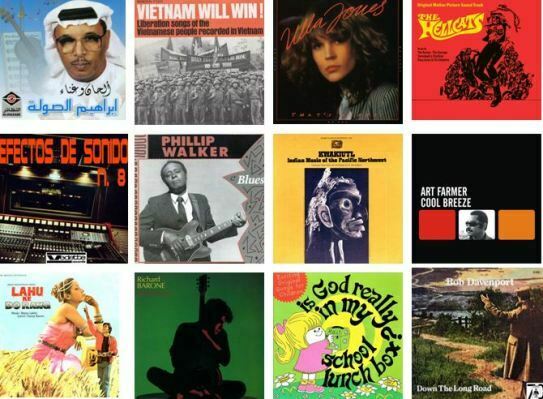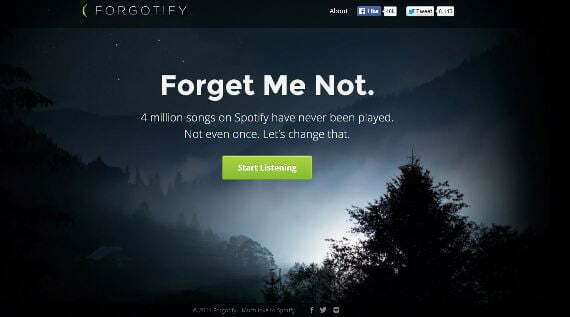My favourite website of the moment is the marvellous Forgotify.com. It is based on an absolutely inspired idea that also reveals a profound truth or two. Its simple premise is that there are four million songs on the music service Spotify which have been played by no one – around 20%. So Forgotify makes these neglected songs available. Simple, but brilliant.
The site (which has been created by three independent developers and is not a creation of Spotify itself) offers one un-listened-to track at a time, selected at random. There is no search or browse option – you simply have to click through what you’re offered, one by one. You get the name of the recording, the album cover and the Spotify play button. Needless to say, you need to be signed up to Spotify to be able to play the music.
The offering is fascinating view of the nether world of music culture – the world’s largest bargain bin display. There are traditional folk song collections, Bollywood soundtracks, classical music re-issues, world music, experimental electronica, sound effects albums, thrash metal bands shocking no one, polka selections and Christian pop. Not all of the names are obscure, however – I came across recordings by Maria Callas, Lonnie Donegan, Sarah Vaughan and Coleman Hawkins in browsing through.
Much of it is, inevitably, forgettable – recordings for which you cannot imagine the reason why they were made in the first place, save for some unfortunate combination of vanity and record company gullibility. Yet there are many gems – I’m certainly pleased to have stumbled across Bally & Power Bross’s sweet guitar and some other stringed instrument on “Z Valiha na Madagaskar“, the quietly explorative jazz of Marc Copland and Dieter Ilg on “Tracks“, the drums of the Yoruba of Nigeria, the unearthly organ music of American composer Erling Wold on his CD “I Weep“, a live recording of the changing of the guard at Buckingham Palace from a sound effects album complete with comments from tourists, inventive Italian jazz drummer Zeno de Rossi’s “Plunge“, American old-time guitarist Smokey Joe Miller playing “An Angel from East Tennessee“, or the out-and-out weirdness of the Children of NYPS singing “Lovely Italy” from the album Gosh, What a Wonderful World. To each his own!
To be selected on Forgotify, a track has to have a ‘0’ popularity rating on Spotify, and then never to have been played. Playing the songs will disqualify them for appearing on Forgotify thereafter, but as new recordings are being added to Spotify all the time, presumably its offspring site will continue at much the same level of 20% unplayed music.
As anyone who works in an archive or library knows, the vast majority of your institution’s holdings will be accessed by no one. Most users select the same objects over and over again, and having a substantial part of your collection never used by anyone is simply the price that must be paid for making what is sought out available. No institution wants to go public with such figures, because it looks like you are storing large amounts of books, papers or whatever which are being used by no one. But they will be used by someone one day we protest, and you cannot be governed by the whims of current taste. Posterity will never forgive us.
At a guess, the average amount of the unused portion of a large library or archive (or gallery or museum) is 90-95%. Smaller collections probably gain more use per item; larger ones inevitably have to hold on to more purely for the sake of holding on to them (most lending libraries of course have disposal policies to clear away old, unused stock). What is certain is that more gets unused than gets used. So Spotify’s rate of just 20% of the collection being unused is outstanding. Of course, online collections reach out to audiences without the constraints that a physical archive faces. But they show how much we want to discover, given the optimum conditions in which to do so.
For what Forgotify demonstrates so powerfully is the urge to discover, and in doing so to bring things back to life. Anyone who has done archival research can speak of the thrill of being the first person to have opened up some document since the day it was created, and to hear the voices of history speak out once more. We bring the past back to life through the simple act of reading, or listening. So Forgotify is not an argument against archives and libraries who store so much that no one ever sees, but instead a justification for having done so. There is nothing so precious as the unseen, or the unheard, because the time will come when it is seen or heard again. It is wrong to keep only that which is known. It is only through exploring the unknown that we will be able to discover anything. Forgetting is the essential counterbalance to remembering.

